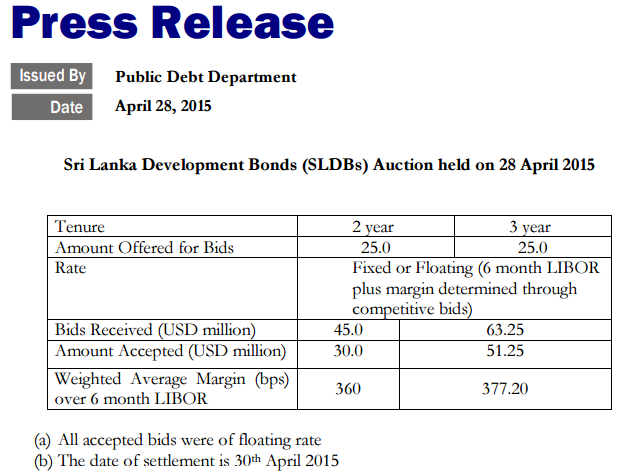(Reuters) - Sri Lankan shares edged up to their highest closing level in more than eight weeks on Thursday, as retail investors picked up risky assets in moderate volumes on hopes companies would report better earnings and as low rates perked up sentiment.
The passage of constitutional reforms that would help establish independent bodies for good governance also buoyed the market, analysts said, adding however concerns over political stability remained.
Sri Lanka's parliament passed reforms Tuesday to reduce some of the president's powers, although they were far fewer than President Maithripala Sirisena had promised.
The main stock index edged up 0.08 percent to 7,179, its highest closing level since March 6. It has gained 4 percent since the central bank cut key rates on April 15, while yields on t-bills have fallen 41-51 basis points since then.
The index gained 5.26 percent in April.
"We saw a bit of activity taking place with select buying on fundamentally sound stocks on earning expectations," said Dimantha Mathew, research manager at First Capital Equities (Pvt) Ltd.
Turnover stood at 801.8 million rupees ($6.02 million), compared with this year's daily average of around 1.06 billion rupees.
The market saw net foreign outflow of 65 million rupees worth of shares on Thursday. Foreign investors have bought net 3.74 billion rupees worth shares so far this year.
Analysts said the market could be dull until the perception of political uncertainty is addressed and many investors would be in a wait-and-watch mode before the parliamentary elections.
Shares of leading mobile phone operator Dialog Axiata Plc rose 1.77 percent, while Finlays Colombo Plc jumped 9.41 percent.
The index lost 6.6 percent last month, its biggest monthly drop since October 2012, as investors sold holdings to settle margin trades amid concerns about political stability and a rise in interest rates.
Sri Lanka's stock and foreign exchange markets will be closed on Friday for May Day and on Monday for a Buddhist religious holiday. Normal trading will resume on Tuesday.
($1 = 133.1000 Sri Lankan rupees)
The passage of constitutional reforms that would help establish independent bodies for good governance also buoyed the market, analysts said, adding however concerns over political stability remained.
Sri Lanka's parliament passed reforms Tuesday to reduce some of the president's powers, although they were far fewer than President Maithripala Sirisena had promised.
The main stock index edged up 0.08 percent to 7,179, its highest closing level since March 6. It has gained 4 percent since the central bank cut key rates on April 15, while yields on t-bills have fallen 41-51 basis points since then.
The index gained 5.26 percent in April.
"We saw a bit of activity taking place with select buying on fundamentally sound stocks on earning expectations," said Dimantha Mathew, research manager at First Capital Equities (Pvt) Ltd.
Turnover stood at 801.8 million rupees ($6.02 million), compared with this year's daily average of around 1.06 billion rupees.
The market saw net foreign outflow of 65 million rupees worth of shares on Thursday. Foreign investors have bought net 3.74 billion rupees worth shares so far this year.
Analysts said the market could be dull until the perception of political uncertainty is addressed and many investors would be in a wait-and-watch mode before the parliamentary elections.
Shares of leading mobile phone operator Dialog Axiata Plc rose 1.77 percent, while Finlays Colombo Plc jumped 9.41 percent.
The index lost 6.6 percent last month, its biggest monthly drop since October 2012, as investors sold holdings to settle margin trades amid concerns about political stability and a rise in interest rates.
Sri Lanka's stock and foreign exchange markets will be closed on Friday for May Day and on Monday for a Buddhist religious holiday. Normal trading will resume on Tuesday.
($1 = 133.1000 Sri Lankan rupees)
(Reporting by Ranga Sirilal and Shihar Aneez; Editing by Biju Dwarakanath)
